By Claire N. Bacon, ACN, CNC
Coffee… Healthy or Not? It all depends…
The way I’ll answer this is the way I answer most questions in our nutritional consults. It depends on the individual. Whether a food is healthy for us or not has to be taken into context. We need to ask questions like: what else is going on with the person’s health, what kind and how much are they drinking, and how is it being prepared?
It’s a worthwhile question, because the majority of Americans consume coffee every day. Since it has become a “lifestyle activity” to hang out at coffee shops, teenagers and young adults are lining up more and more for their daily “Cup O’ Joe.” The biggest problem I see is that most people are letting their taste buds decide everything that comes into their mouths. Coffee is just one more way that huge amounts of sugar are undermining our collective health.
Avoiding Chemicals in Coffee
Organic versus Conventional For a coffee to be labeled “organic,” producers cannot use synthetic pesticides, herbicides and fertilizers on 95% of the beans in the package. Sadly, 100% is not required. There might still be some trace chemical residues in organic coffees. But what makes the biggest difference here is for the farm workers and the environment, not the consumer.
Conventional coffee is typically a heavily sprayed crop. Following more traditional farming practices reduces the amounts of chemicals that enter the ground, helps to maintain partial forest canopy, reduces erosion, and reduces the toxic chemical exposures that cause cancer for so many farm workers these days. Fair Trade is also not a perfect certification; Fair Trade USA’s standards are no longer fully aligned with those of Fair Trade International, but generally, most Fair-Trade coffee is shade grown under natural tree canopies and farmers are encouraged to follow sustainable practices for disposing of wastes, maintaining buffer zones and minimizing water use.
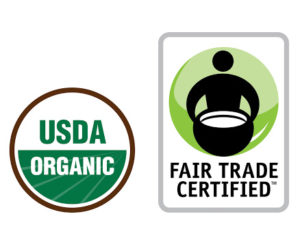
The amount makes a difference: 1 cup vs. 1 pot It’s funny how people like to justify their coffee habit. People like to tell me, “I just have one…but it’s a super large thermos mug… Is that ok?” Well, no. There have been many studies done on coffee and its effects on our health. A lot of these studies are inconclusive or conflicting. You can click the button below to read a few studies from the American Journal of Clinical Nutrition. It seems the standard amount used in the research is about 200 mg/day, or about 2 cups of coffee. So, if the researchers don’t find quantifiable effects from 1 cup, to me that’s a sign it’s probably ok.
Hormonal Effects
Here’s the kicker – caffeine has a strong effect on your adrenal glands. It causes them to increase cortisol and adrenaline output. This is from where you feel that kick of energy. But what if you’ve been consuming coffee, and stressing out, and worrying, and eating a poor diet, etc.? Drinking coffee may just be the straw that breaks the camel’s back, and results in an adrenal crash. This means, exhausted adrenal glands with very little or dysregulated hormonal output. If you’re feeling dependent on coffee, talk to us right away. We can do an Adrenal Stress Index test and find out what’s really going on.
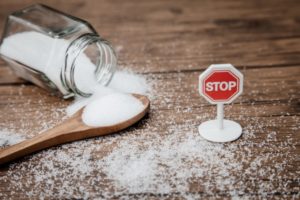
Preparation
What else are you adding? Sugar is an obvious no-no. Not many people are admitting to adding sugar anymore. But there are a lot of closet Splenda and NutraSweet users out there; for some reason, people are still more fearful of calories than they are of chemicals. So, here’s what aspartame breaks down into: aspartic acid, phenylalanine, and methanol which converts into formaldehyde. FDA studies claim that consumption of aspartame is safe; however, for some people, aspartame is associated with a multitude of negative side effects, like:
- headaches,
- dizziness,
- migraines,
- confusion,
- increased hunger, and
- neurotoxicity.
In the holistic world, Stevia is a much safer alternative.
Creamer
What about creamer? Ideally, there wouldn’t be any problem with raw milk, except that it’s near impossible to find in Georgia. Pasteurized Half and Half is not the worst thing in the world, if you can tolerate dairy. But Coffee Mate? Have you seen these ingredients:
- sugar,
- water,
- partially hydrogenated oil,
- sodium caseinate,
- propylene glycol,
- dipotassium phosphate,
- polysorbate 60,
- sodium stearoyl cactylate,
- artificial colors and flavors, and
- sucralose, an artificial sweetener?
The consumer group EWG.org just happens to rate Coffee Mate a 10 on a scale from 1 to 10. This product has 2 tsp of added sugar per serving. Plus, it contains artery-clogging trans-fat, genetically modified ingredients and questionable processing methods. No, thank you!
What’s a better option for a truly healthy coffee? Follow the lead of the Bulletproof guys and add some brain-promoting real fats to your coffee! Butter makes it creamy, and coconut oil makes it sweet. Personally, I like to brew my coffee in a French press. Then, transfer to a small Magic Bullet cup and add the butter, coconut oil, and dash of cinnamon. Blend it for about 30 seconds and pour it into my coffee cup. And there I’ve got a fully organic, frothy, and decadent love in a cup. Love it!
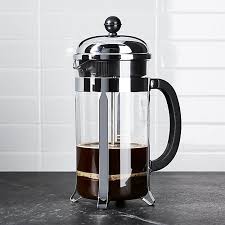
Brewing
Brewing in a glass pot or Keurig? Wow, you might hate me for saying this, but that convenient K-cup is probably leaching nasty chemicals into your coffee. Sorry! According to a CDC study, BPA was detected in the urine of 95% of the people tested. Clearly, our widespread use of plastic products is catching up with us. Plastic pods and plastic lids are just one more source of endocrine-disrupting chemicals that we’d be better off without. The endocrine disrupting chemicals are what we work on removing though our 21-day Purification Cleanse. Just think how much better you would be – year-round – without this daily source of pollution in your cup?
Medications and Coffee
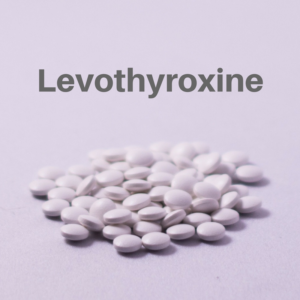
Taking Thyroid Hormone? If you’ve been on thyroid hormone for a while, you know to take your meds on an empty stomach. But did your doctor tell you to take it AT LEAST an hour away from coffee? He should have! Because this study and this one indicate some detrimental effects. Clearly, we need more research on how coffee affects thyroid hormone.
By the way, whether you are hypothyroid or hyperthyroid (or even autoimmune thyroiditis) you can likely benefit from Thytrophin PMG. This is a special protomorphogen extract from healthy thyroid tissue that has had its T4 hormone removed. All that’s left are the blueprints for normal tissue growth and repair. And it’s not affected by when you have your coffee!
Taking HRT (synthetic estrogen)? There is also a potential link between Hormone Replacement Therapy and how you metabolize the caffeine in coffee. Having very high estrogen levels seems to increase the physical effects of caffeine – leading to jumpiness, sweating, and/or nervous stomach. Furthermore, this study surprisingly points out that the effects of coffee on women’s estrogen levels may vary (either increase or reduce) as a function of race. Clearly, more research is needed to clarify what this means for the thousands of women consuming coffee every day.
Mood and Coffee

Are you depressed? Chronic consumption of caffeine has been shown to have specific effects on our brain chemistry and neurotransmitters. Chronic intake of caffeine does a few things:
- It increases our serotonin receptors (helps regulate mood),
- inhibits GABA production (GABA is a calming neurotransmitter),
- increases acetylcholine (involved in muscle contraction), and
- reduces some B vitamin co-factors that are necessary for synthesis of serotonin, dopamine, and GABA.
Yes, you may feel a quick boost in alertness, energy and mood. However, after a long period of use, you may develop neurotransmitter deficiencies. These deficiencies make you feel lower or bluer than you should.
In Summary
To summarize: yes, coffee has great potential to be a healthy food, if you can satisfy these things:
- Only consumed sparingly,
- grown without synthetic pesticides,
- not adulterated with anything toxic, and
- if the individual doesn’t have any complicating factors.
Benefits to your body include antioxidants and polyphenols (which you still need to get from vegetables and fruit), mental clarity, and enhanced mood. So, make your healthy choices where you can, so you can fully enjoy your “love in a cup!”
Healthy Coffee Alternatives
Are you planning to be part of our January Purification Cleanse? You will need some great alternatives, because coffee will be eliminated throughout the 21 days. In addition to using “adaptogenic herbs” for alertness, here are some of our drinkable favorites…
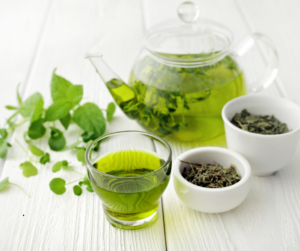
Matcha Green Tea can be used to make an awesome Coconut Matcha Latte. MMM!! Matcha tastes a bit grassy, so I like to add it to a Latte or blend it into a smoothie. Matcha is great because you’re actually consuming the whole tea leaf. You don’t want to overheat the delicate phytochemicals, so here’s what to do. While the tea kettle is heating, I put unsweetened coconut milk in a Mason jar. Then, add 2 tsps Matcha and 1/2 tsp of cinnamon. Next, put the lid on and shake it up until there are no more lumps. When the tea water is hot, pour in just enough to make it the temperature you want. Taste and adjust to your liking. If you like it sweeter, try adding a few drops of Vanilla Creme Stevia.

Chai Roobios Tea has fantastic flavor and no caffeine. Perfect for your Purification Cleanse! Chai tea typically contains herbs like cinnamon, cardamom, ginger, black peppercorn, fennel seed, cloves and/or star anise. It’s a beautiful, spicy blend. It will leave your senses fully engaged!
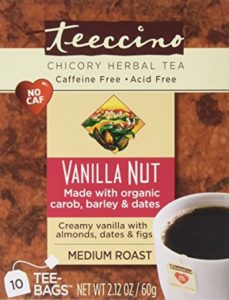
Teechino is a chicory tea with multiple varieties – all are super tasty. It is amazing how much this tastes like coffee! Granted, it’s a bit more watered down, but it’s still a lovely addition to your morning. You won’t be missing out!
One More Healthy Choice…
Zhena’s Gypsy Coconut Chai Tea is one I have in our pantry all the time, and at the office. It’s so good! This blend is made with Green Tea. It does have some caffeine, but not as much as regular coffee. Plus, it’s organic and has lots of antioxidants. So yummy!
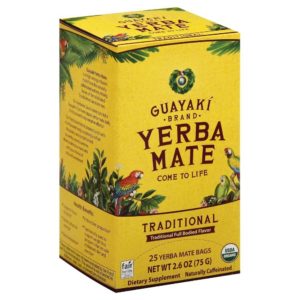
Yerba Mate also contains some caffeine, similar to black tea, but again, has less than coffee. It is a traditional South American brew that offers the “strength of coffee, the health benefits of tea, and the euphoria of chocolate” all in one beverage. But it doesn’t taste like chocolate. If you’ve never had it, it tastes grassy and similar to a green tea.


